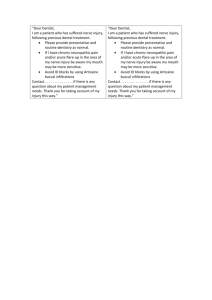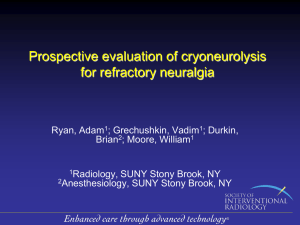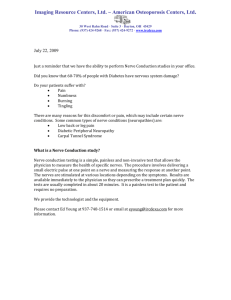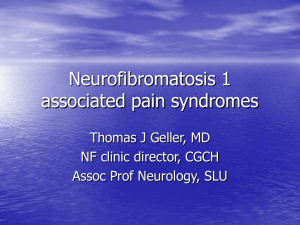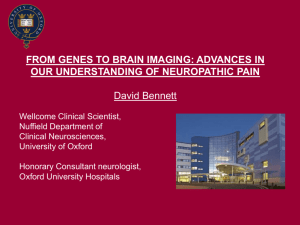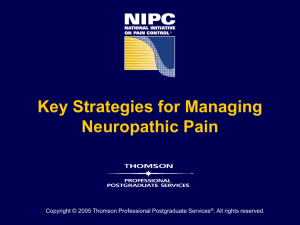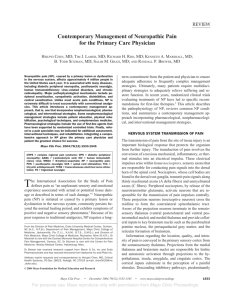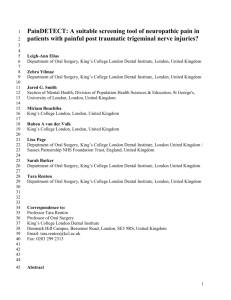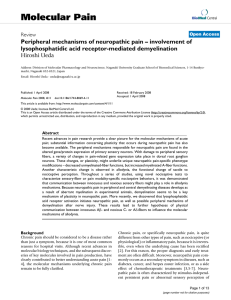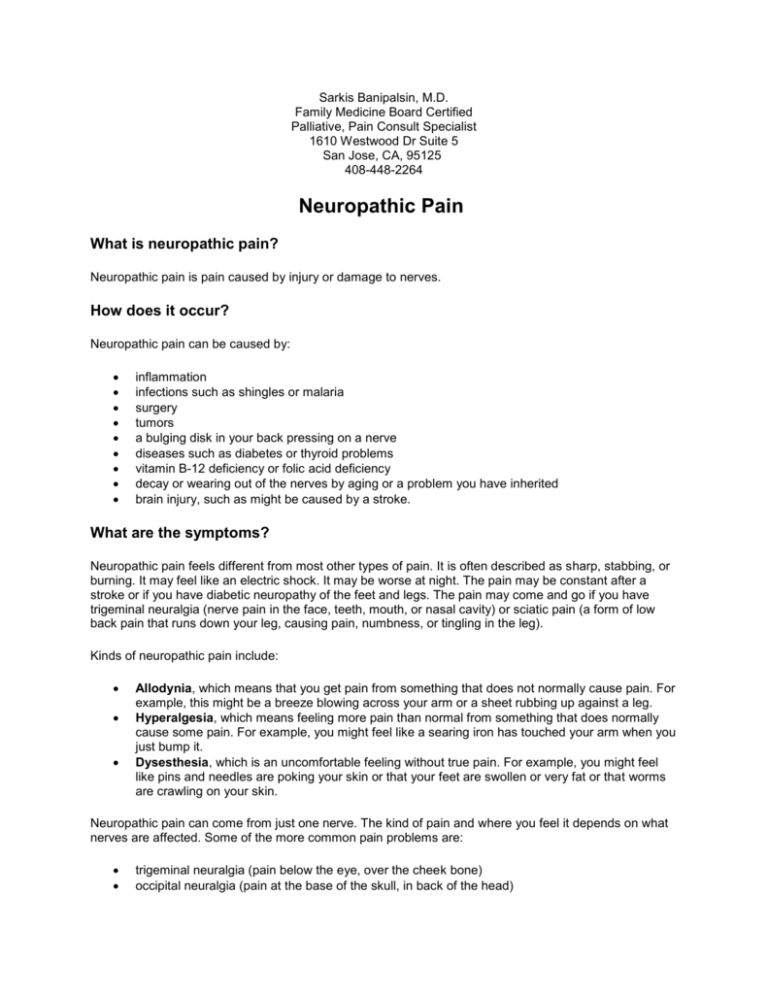
Sarkis Banipalsin, M.D.
Family Medicine Board Certified
Palliative, Pain Consult Specialist
1610 Westwood Dr Suite 5
San Jose, CA, 95125
408-448-2264
Neuropathic Pain
What is neuropathic pain?
Neuropathic pain is pain caused by injury or damage to nerves.
How does it occur?
Neuropathic pain can be caused by:
inflammation
infections such as shingles or malaria
surgery
tumors
a bulging disk in your back pressing on a nerve
diseases such as diabetes or thyroid problems
vitamin B-12 deficiency or folic acid deficiency
decay or wearing out of the nerves by aging or a problem you have inherited
brain injury, such as might be caused by a stroke.
What are the symptoms?
Neuropathic pain feels different from most other types of pain. It is often described as sharp, stabbing, or
burning. It may feel like an electric shock. It may be worse at night. The pain may be constant after a
stroke or if you have diabetic neuropathy of the feet and legs. The pain may come and go if you have
trigeminal neuralgia (nerve pain in the face, teeth, mouth, or nasal cavity) or sciatic pain (a form of low
back pain that runs down your leg, causing pain, numbness, or tingling in the leg).
Kinds of neuropathic pain include:
Allodynia, which means that you get pain from something that does not normally cause pain. For
example, this might be a breeze blowing across your arm or a sheet rubbing up against a leg.
Hyperalgesia, which means feeling more pain than normal from something that does normally
cause some pain. For example, you might feel like a searing iron has touched your arm when you
just bump it.
Dysesthesia, which is an uncomfortable feeling without true pain. For example, you might feel
like pins and needles are poking your skin or that your feet are swollen or very fat or that worms
are crawling on your skin.
Neuropathic pain can come from just one nerve. The kind of pain and where you feel it depends on what
nerves are affected. Some of the more common pain problems are:
trigeminal neuralgia (pain below the eye, over the cheek bone)
occipital neuralgia (pain at the base of the skull, in back of the head)
post-herpetic neuralgia (pain that you keep having after shingles, which is an infection of the
nerves by the chickenpox virus).
How is it diagnosed?
Your healthcare provider will ask about your symptoms and medical history. He or she will examine you.
Tests such as X-rays, blood tests, scans, and nerve conduction tests may be done to try to find the
specific cause of the pain. Your healthcare provider may also refer you to a neurologist, neurosurgeon, or
physiatrist for additional testing.
How is it treated?
Nonprescription and prescription pain medicines sometimes work well for neuropathic pain. If these
medicines do not work well for you, your healthcare provider may prescribe antidepressants or
antiseizure medicines that interfere with pain signals to the brain. They may be used alone or with other
drugs. These medicines take days or weeks to work, so you must take the medicine every day on a set
schedule to reduce the pain. These medicines rarely take away the pain completely, but they can help
reduce it to a level you can tolerate.
Other treatments may include:
massage
heat or cold on the painful area (Each day one treatment might feel better than the other. If your
ice-bag causes pain one day, switch to warm, moist heat or a heating pad for that day. Go back
to ice another day.)
biofeedback (a method of controlling your body's responses with your mind)
TENS, which is a device that uses electrodes on the skin to send small electrical impulses to your
nerves to block pain (TENS stands for transcutaneous electrical nerve stimulation)
skin patches of numbing medicine, such as menthol (without prescription), lidocaine, or gels with
anti-inflammatory medicine in them (prescriptions are needed for these medicines)
acupressure or acupuncture
shots of local anesthetics, steroids, or other chemicals to block pain signals or decrease
inflammation
surgery to remove the root of the nerve, including electrosurgery, microsurgery, and radio wave
surgery
Your primary care provider will probably first recommend trying basic pain medicines and nonmedical
treatments like heat or ice. He or she may refer you for physical therapy, massage, or manipulations.
Biofeedback or use of a TENS device may be prescribed. If these things do not help your pain, your
provider will most likely refer you to a pain specialist or pain clinic.
A pain specialist usually is needed if you are going to have nerves blocked by anesthetic shots or if you
might have any type of nerve surgery. Shots of drugs into or around the nerve can deaden the nerve,
providing pain relief that is sometimes temporary and sometimes permanent. If the pain relief is good but
temporary, sometimes a permanent nerve block can be done using electrosurgery or radiowave surgery.
This may result in numbness in the area where the pain used to be.
Studies have not yet shown that herbal medicine treatments work well in the treatment of pain.
Acupuncture or acupressure have also been studied and don't work very well. Some people might get
wonderful relief, but that is not common. Capsaicin cream does work better than placebo creams, but the
relief is not total.
How long will the effects last?
Some chronic pain problems do not go away. Other problems hurt for awhile, and then the pain mostly
goes away. Often the pain goes away because the nerve is so damaged that it stops working altogether.
When this happens, the pain starts to feel like cold or numbness.
How can I help take care of myself?
Neuropathic pain is a long-term, frustrating problem. You can help yourself by acknowledging that you will
have some good days and some bad days. Going up and down with medicines or other treatments can
be distracting and not very helpful with pain management. Often, your goal needs to be getting some pain
relief and focusing on getting back to the things you enjoy or need to do.
Try hard to avoid narcotic pain medicines for neuropathic pain. The development of tolerance and the
need for higher and higher doses can become a serious long-term problem if you start using narcotic
(opioid) drugs as treatment for a chronic pain condition. If you do start narcotic pain medicine, your
healthcare provider may ask you to sign an agreement about how you will and won't use these addictive
medicines.
Developed by RelayHealth.
Published by RelayHealth.
Last modified: 2011-02-21
Last reviewed: 2010-11-03
This content is reviewed periodically and is subject to change as new health information becomes available. The information is
intended to inform and educate and is not a replacement for medical evaluation, advice, diagnosis or treatment by a healthcare
professional.
References
Adult Advisor 2011.1 Index
© 2011 RelayHealth and/or its affiliates. All rights reserved.

